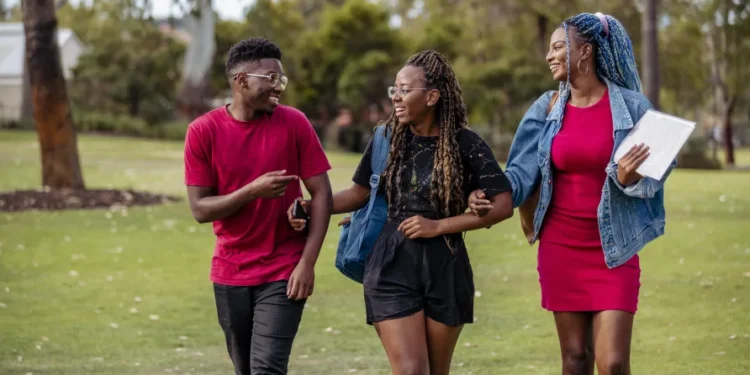African students and other international students have been required to have more savings to secure Australian visa.
This disclosure was made after the Australian government announced that it would increase the amount of savings they will need to get a visa.
Australia’s government also went on to warn several colleges of fraudulent student recruitment practices, as part of efforts to rein in record migration.
African students and others are required to demonstrate savings of no less than A$29,710 ($19,576) to obtain their visa, marking the second increase within approximately seven months. The previous amount was raised from A$21,041 to A$24,505 back in October.
READ MORE: LemFi Suspends Ghana Operations, Here’s Why
The recent months have seen a series of actions taken to strengthen student visa regulations, in response to a surge in migrants following the easing of COVID-19 restrictions in 2022. This has further strained an already limited rental market.
What The Savings Is About
International education is one of Australia’s largest export industries and was worth A$36.4 billion ($24 billion) to the economy in 2022/23.
But record migration, mostly driven by international students, has put the government under pressure with rental prices soaring across the country. Net immigration rose 60% to a record 548,800 in the year to Sept. 30, 2023.
The government expects its policies could halve Australia’s migrant intake over the next two years.
Why You Need To Meet Savings Requirement For Australian Visa
- Replacing the Genuine Temporary Entrant (GTE) Requirement with a Genuine Student (GS) requirement to crack down on students coming primarily to work rather than study.
- Extending Post-Study Work Rights (PSWR) by up to two extra years for international students, effective from 1 July 2023, allowing them to secure employment opportunities in their chosen fields.
- Requiring a minimum total score of 5.5 for international students to enrol in their chosen university and programme.
- Capping work hours during study terms and semesters at 48 hours per fortnight from 1 July 2023.
- Capping the Skilled-Recognised Graduate visa, allowing recent engineering graduates to stay, work, or study in Australia for up to 18 months, effective from 22 December 2023.
- Prohibiting international students from enrolling in two courses at the same time within the first six months of their principal course, effective from 8 September 2023.
More
Home Affairs Minister Clare O’Neil said warning letters had been sent to 34 education providers for “non-genuine or exploitative recruitment practices”. They could be jailed for up to two years and banned from recruiting students if found guilty, she said.
“Dodgy providers have no place in our international education sector. These actions will help weed out the bottom feeders in the sector that seek to exploit people and trash the reputation of the sector,” O’Neil said in a statement.
What You Need To Know About Australia’s New Migration Strategy
The Australian government didn’t introduce the Migration Strategy until December 2023, meaning that it had little direct effect on visa trends in the first half of fiscal 2023/24. However, its anticipated release likely helped drive higher student application volumes in the first half of the year. Students wanted their applications to be processed under the existing system, which they knew, rather than wait and adapt their application to the new policies.
This document, focused on increasing the integrity and quality of Australia’s international education sector, outlined eight key actions that would drive migration system reform:
- Introduce measures to improve integrity in international education and support genuine students.
- Increase English language requirements to reduce potential workplace exploitation and improve student education quality.
- Apply more targeted scrutiny to student visa applications from high-risk providers.
- Reduce misuse of Australia’s student visa system through bolstering the student visa integrity unit.
- Strengthen requirements for international education providers.
- Restrict onshore visa hopping that undermines system integrity.
- Simplify and strengthen Temporary Graduate visas.
- Support international students and graduates to realize their potential.
These actions are intended to create a more robust international education system that prioritizes attracting students genuinely looking to complete their studies in Australia. Key to these efforts is the introduction of the Genuine Student Test, a list of questions that will increase clarity around post-study temporary migration pathway eligibility and discourage false applications. Additionally, Australia will focus on improving visa processing by prioritizing applications based on the risk level of providers.
Looking Forward
These policy changes are focused on reducing application fraud, which should have the long-term impact of encouraging sincere applications and discouraging misuse. Already, applicants from some major source countries, such as India, have been asked to withdraw their visa applications and overall application volumes have dropped. While this will likely cause a limited decline in overall international student numbers in Australia in the short term, it puts the country on a solid footing for more sustainable future growth.
Maintaining sustainable growth is critical not just for the destination country, but also for the students hoping to study there. Housing shortages have become a major issue in every destination market, and concerns regarding post-study work permits have also arisen in multiple destinations.
As a result, Australia is not the only country to have recently enacted government shifts regarding international education. Canada and the UK have also updated policies impacting student mobility, and approaching US elections could lead to changes in the world’s top destination market.










